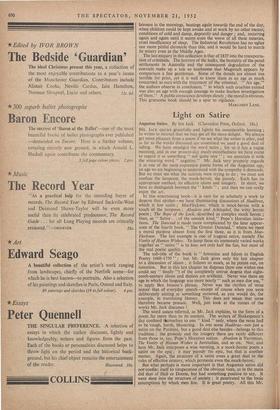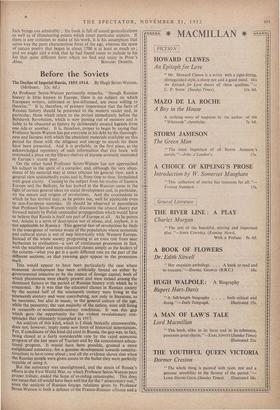Light on Satire
Augustan Satire. By Ian Jack. (Clarendon Press, Oxford. 18s.)
MR. JACK carries gracefully and lightly his considerable learning ; he writes to instruct that we may get all the more delight. We always get more pleasure from a poem if we see what the writer is after, and as far as the works discussed are concerned we need a good deal of telling. We have smudged the word satire ; for us it has a vague meaning, and in our present-day mealy-mouthedness we have come to regard it as something " not quite nice " ; we associate it with the smearing word " negative." Mr. Jack very properly regards it as one of the most expressive poetic forms of the Augustan age, an age we are beginning to understand with the sympathy it demands. But we must see what the satirists were trying to do ; we must not confuse the lampoon, the mock-heroic, the parody. Each has its appropriate method, its effective idiom and imagery. In short, we have to distinguish between the " kinds " ; and then we can really enjoy the art.
In this entertaining book—it is rare for so scholarly a work to deserve that epithet—we have illuminating discussions of Hudibras, which is low satire ; MacFlecknoe, which is mock-heroic with a touch of the lampoon ; Absalom and Achitophel, the witty heroic poem ; The Rape of the Lock, described as complex mock heroic ; then, as " Satire ... of the comick kind," Pope's Horatian imita- tions. The Dunciad is made more complicated by the later appear- ance of the fourth book, " The Greater Dunciad," where we meet a moral purpose absent from the first three, as it is from Mac- Flecknoc. The last example is one of tragical satire, namely The Vanity of Human Wishes. To lump these six immensely varied works together as " satire is to lose, not only half the fun, but most of the real poetic quality.
The sub-title of the book is " Intention and Idiom in English Poetry 1660-1750 " ; but Mr. Jack gives only his last chapter to a discussion of idiom ; it follows so much, as he points out, on intention. But in this last chapter he disposes (how one wishes one could say "finally ") of the completely untrue dogma that eight- eenth-century idiom and diction are artificial. Never was there an age in which the language was more nearly " such as men doe use," to apply Ben Jonson's phrase. Never was the rhythm of verse nearer that of everyday speech—except of course when you were deliberately aiming at something removed, as you would do, for example, in translating Homer. This does not mean that verse therefore became prosaic. Well, just look at the names of the works Mr. Jack discusses I The word Saturn referred, as Mr. Jack explains, to the form of a poem far more than to its content. The writers of Shakespeare's day confined themselves to one " kind " only, where the verse had to be 'rough, harsh, blustering. In one sense Hudibras—not just a satire on the Puritans, but a good deal else besides—belongs to this tradition ; the prosody and the imagery there are vastly different from those in, say, Pope's Horatian satires. Absalom is Varronian, The Vanity of Human Wishes is Juvenalian, and so on. Nor, and here Mr. Jack interposes a wise warning, is a mock-heroic poem a satire on the epic ; it may parody the epic, but that is another matter. Again, the structure of a satire owes a great deal to the rules of effective oratory, which permeate even the mock-heroic.
But what perhaps is more important is that Augustan satire did nor conffin itself to vituperation of the obvious vices, as in the main did that of Hall or Donne, but had something positive to say. It went deep into the structure of society ; it penetrated to the basic assumptions by which men live. It is great poetry. All this Mr. Jack brings out admirably ; his book is full of sound generalisations as well as of illuminating points which cover particular aspects. If there is any criticism to make of his-work, it is his assumption that satire was the most characteristic form of the age, whereas the spate of nature poetrS, that began in about 1700 is at least as much so ; and we might add a' wish that he had found room to include in his list that quite different form which we find and enjoy in Prior's Alma. BONAMY DOBREE.











































































 Previous page
Previous page